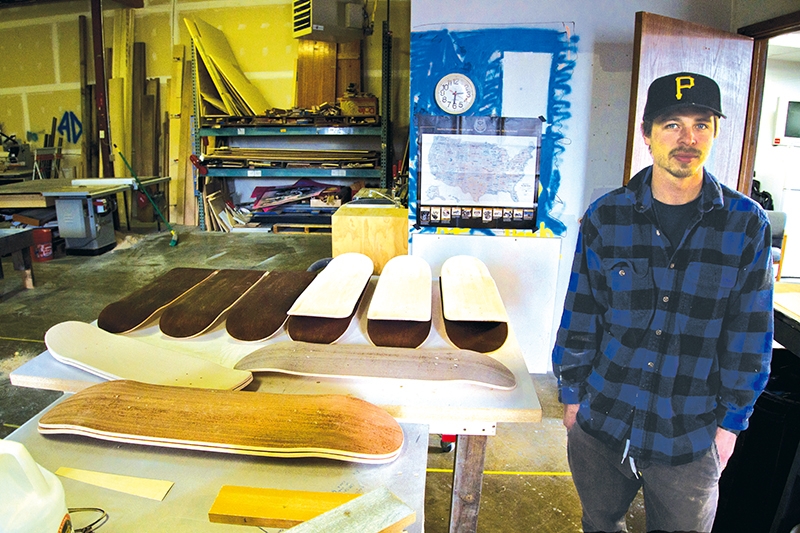Building Boards After Dark
Skate
After Dark Skateboards is a new, thriving project in the Salt Lake City community. Owner, creator and visionary Mark Judd brings his fine-tuned woodworking expertise from the cabinetry industry to his passion for skateboarding, making some of the highest-quality handmade skateboards in America. Between a full-time job and a family, Judd spends around 30 hours every week in his wood shop. On an almost daily basis, you will find him slaving away at his craft, making sure every After Dark skateboard is pressed, shaped, printed and packaged to meet his personal standard. Every step is done by hand to provide the lightest—and possibly the strongest—skateboard I have ever skated. I wanted to find out what made these skateboards so great, so I went down to the A.D. factory to learn, firsthand, what it takes to make AA grade wood.
A.D. spawned from a skate crew of homies when Judd was a kid during the “Dirty Hessian” era. The crew was Judd, Casey McBride, Brody McBride, Derek Merkly and Caleb Orton, who actually helps Judd a few times a month. These homies are super important to his direction: Judd says, “Once I started making skateboards, it just seemed like the right logo, and the right name, so I talked to my homies and made sure they were all cool with it, and went with that.” That was in 2010. For the first year, Judd was doing work out of the basement of his grandmother’s house before moving into the current A.D. factory just off of Wright Brothers Drive in Salt Lake City. He was building up a stock of maple scraps that some guys from work were saving for him. “It’s kind of cool the way shit worked out ’cause when I started using scraps, I started realizing how cool veneer was and how interested in it I was. I got the opportunity to work in the veneer room at my day job, so I was able to start holding on to the scraps a little better,” says Judd. His employer had a surplus of wood due to some changes in specifications, so Judd was able to buy the rest of what they had. Meanwhile, he was still building his press. The mold of the press was built from slats of 1”x10” wood cut in various shapes and stuck together, then sanded smooth. The press was originally made of wood clamps, but Judd knew that to get the quality he wanted, he would have to contract his brother-in-law to weld him a steel hydraulic press.
Building a skateboard out of scrap wood might sound kind of sketchy, but the veneer scraps from the cabinets are the perfect size for making skateboards. Judd’s employer uses only the highest specification AA grade wood—only one out of 100 trees cut down meet it. These 1 square-foot pieces of wood, either 1/16” or 1/24” in thickness, get staggered and glued together, varying the grain directions to help improve the strength. Judd speculates most board companies may use an AA grade top and bottom sheet, but he is inclined to think that these foreign-made boards have lower grade cores to save a couple dollars. These cores are not visible to the eye, but the lower-grade wood creates weaknesses throughout the board.
After the board has sat in the 2-ton press for an hour, Judd pulls the board out and uses a template to draw the shape of the board. He then uses a combination of saws and routers to shape the board. Once this is done, Judd stains the board to give it a natural look and screen-prints his graphic on.
The quality and locality of the boards sparked interest from local skate crew Sk801, who has commissioned Judd to make boards for them. “Doing the Sk801 boards has really helped me to see that there is potential to push it. I’ve always kept it low key, but Jason [Gianchetta, Sk801 owner] is definitely not that type of person. He’s been out there pushing it and selling boards, bringing me some cash flow and giving me the ability to spend some cash on the shop––get more tools, and get shit rolling,” says Judd.
For the future, he plans to continue working on the process and the quality of the boards while growing his brand: “I want––hopefully and eventually––to get a team together and start making videos. I’d also like to serve other people [who get] boards made through a custom board market: bars, skate shops, people who just want to get boards made to start up a company. As a manufacturer, there are so many options to pick up different distributors or accounts,” says Judd. Within the next five years, Judd plans to be self-employed with his budding business.
Judd would like to thank a bunch of people for helping him get to where he is today: Jason, Caleb, Rob, Sam, the whole A.D. crew, his job, his dad for helping him get stuff started, and his wife for giving him the time away from home to get his dreams going. After Dark Skateboards can be purchased from Hardcore Tattoo and Skate or any of your local Sk801 retailers like Annex, BC Surf and Sport, Blindside, Milo, Salty Peaks or Raunch. If you’re interested in custom boards for your business or occasion, hit up Mark Judd on Facebook with any requests or ideas.
